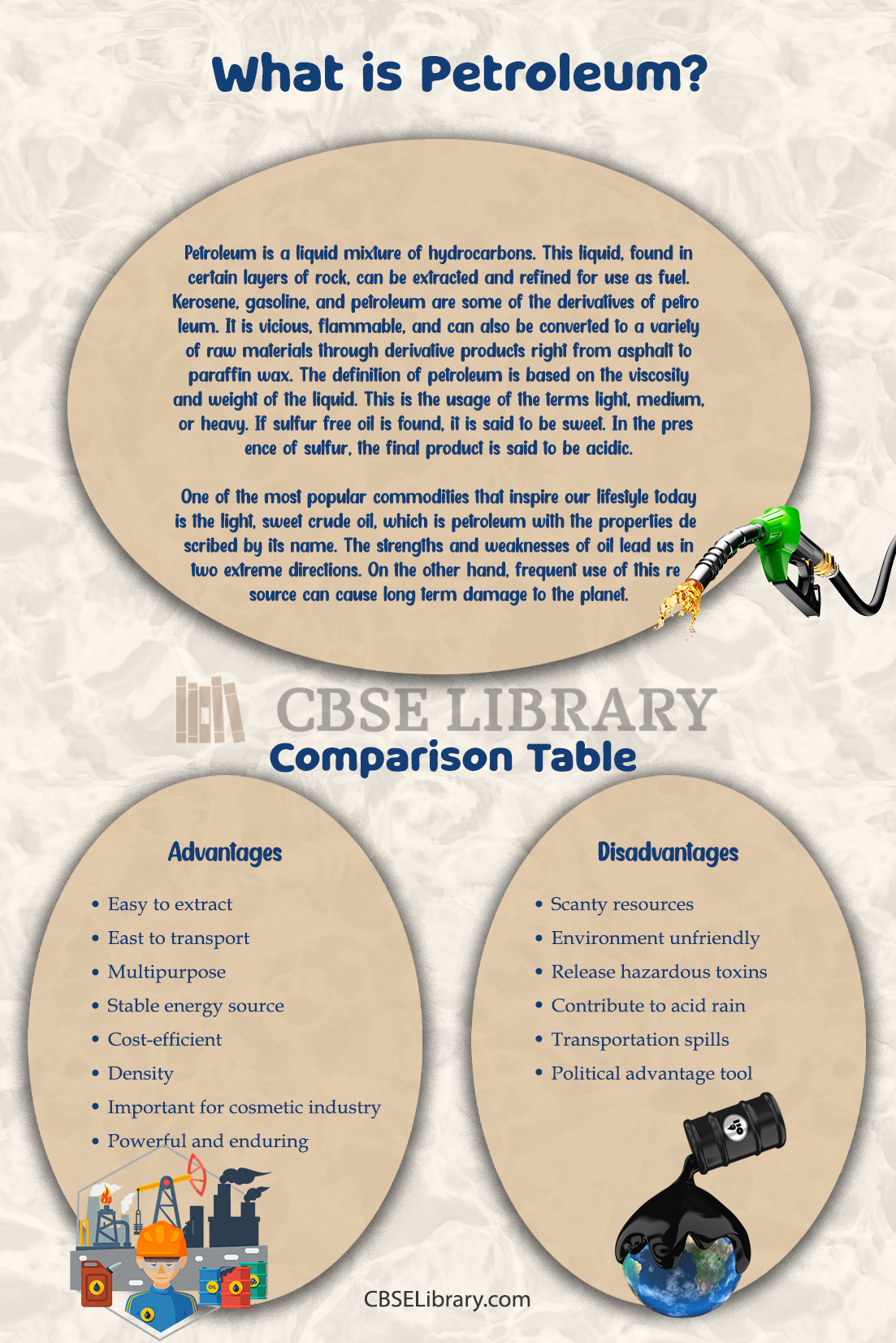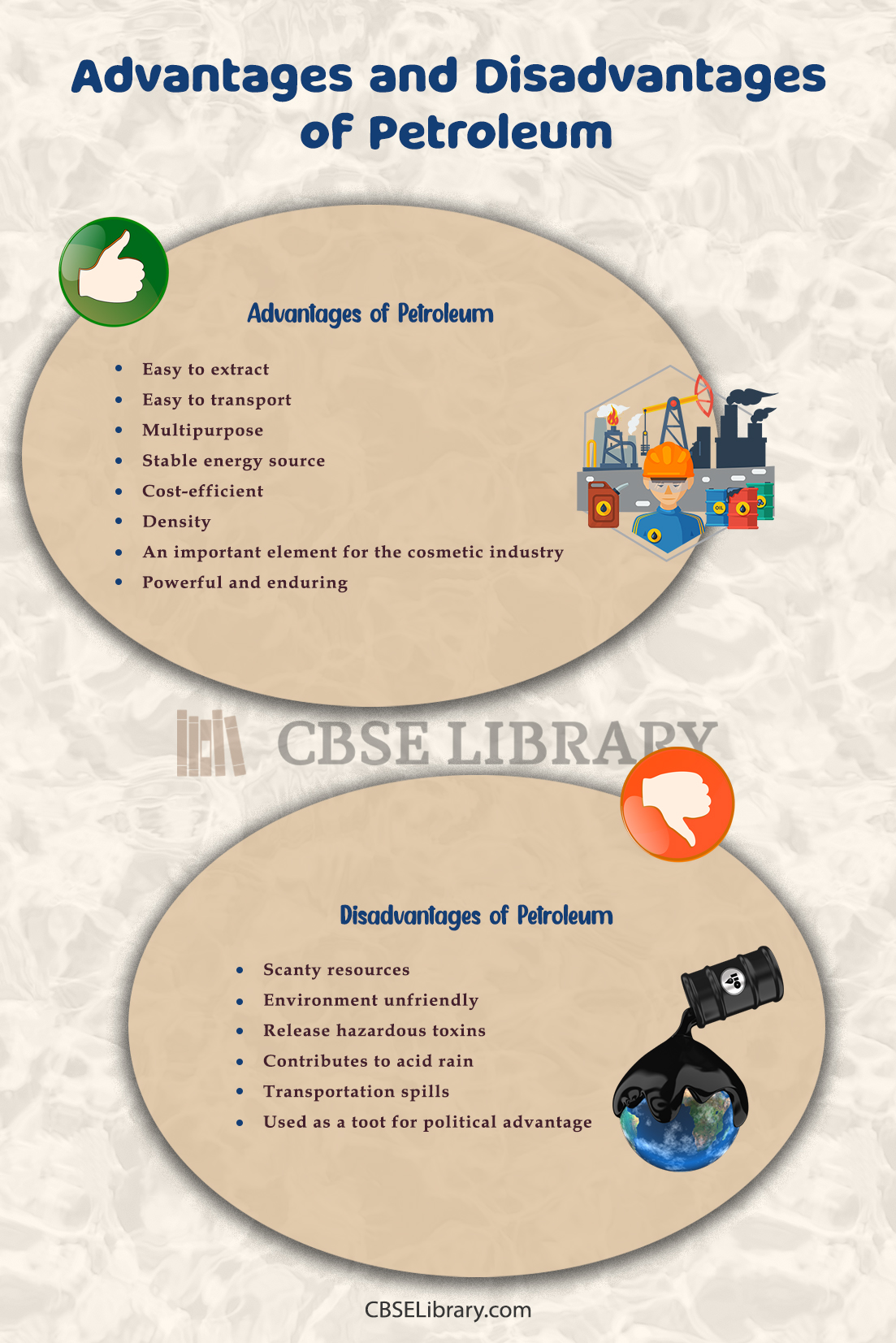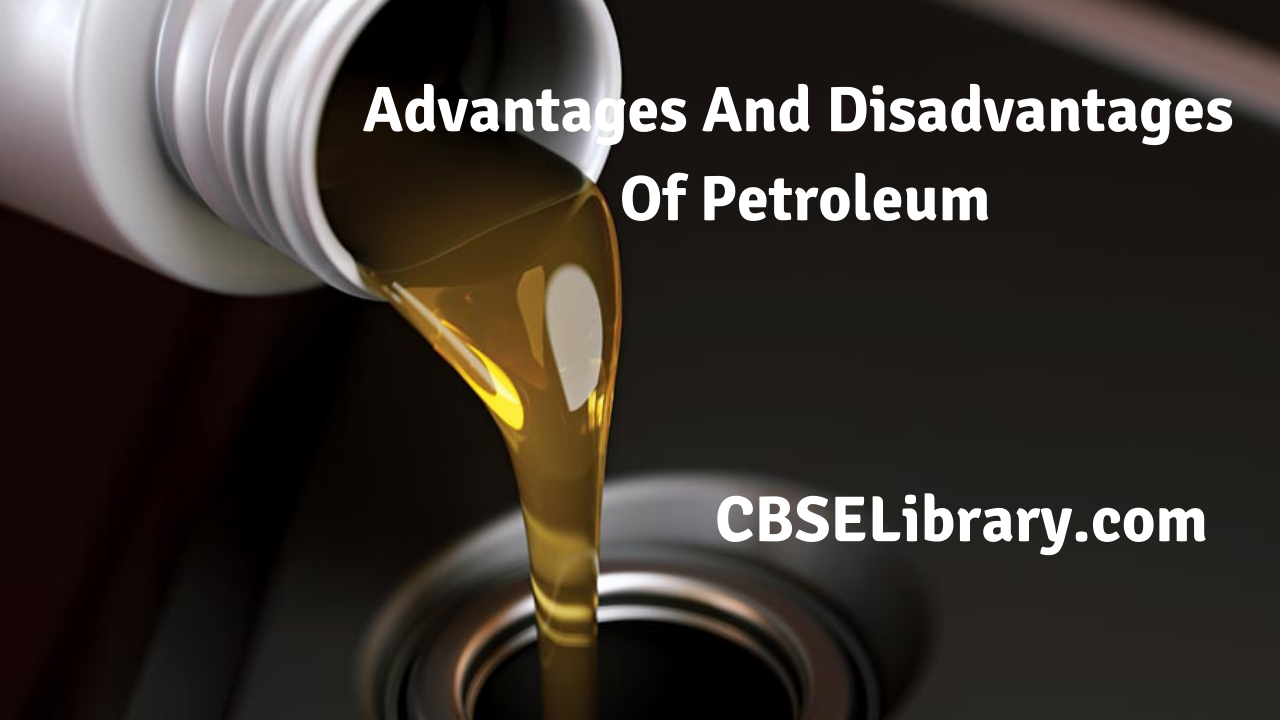Advantages And Disadvantages Of Petroleum: Petroleum is better known as black gold. Petroleum is a natural product that is found under the deep layers of the earth. Petroleum is a fossil fuel, hence it is obvious that it is made from the dead and decomposed organic materials buried inside the earth for millions of years. When these organic matter and microorganisms are exposed to extreme heat and pressure, then a fossil fuel is formed and petroleum is one. Petroleum is widely used in our daily lives. When it is refined, it can raise so many useful by-products which further can be used for domestic and commercial purposes. Because the usage and dependency on refined petroleum are far beyond the expectation, it contributes to global warming and environmental issues with a great difference. Let’s read the article ahead to get to know more about Petroleum.
What is Petroleum? What are the Advantages and Disadvantages of Petroleum?
Petroleum is a liquid mixture of hydrocarbons. This liquid, found in certain layers of rock, can be extracted and refined for use as fuel. Kerosene, gasoline, and petroleum are some of the derivatives of petroleum. It is vicious, flammable, and can also be converted to a variety of raw materials through derivative products right from asphalt to paraffin wax. The definition of petroleum is based on the viscosity and weight of the liquid. This is the usage of the terms light, medium, or heavy. If sulfur-free oil is found, it is said to be sweet. In the presence of sulfur, the final product is said to be acidic.
One of the most popular commodities that inspire our lifestyle today is the light, sweet crude oil, which is petroleum with the properties described by its name. The strengths and weaknesses of oil lead us in two extreme directions. On the other hand, frequent use of this resource can cause long-term damage to the planet.
- Advantages of Petroleum
- Disadvantages of Petroleum
- Comparison Table for Advantages and Disadvantages of Petroleum
- FAQ’s on Advantages And Disadvantages Of Petroleum
Types of Petroleum
Petroleum is a very versatile fossil fuel as, when refined, it gives you so many by-products like lubricants, kerosene oil, and gasoline. Gasoline is primarily used in motor vehicles and small engines like lawnmowers, cultivators, and trimmers. Kerosene oil is used for lighting purposes like in lamps, and heaters. Fuel oil is used in rockets and aerocrafts like jets and planes. Lubricants are used to lubricate rough and worn items like hinges of doors, chains, etc.
Is Petroleum a Renewable or Non-Renewable Energy?
Petroleum is a nonrenewable source of energy. Like other fossil fuels, it is also extracted from the deep layers of the earth through a very complex process. It is present in a limited amount and once used completely, it will disappear for good. However, there are so many good environment-friendly alternatives present to use which are eternal and in abundance like solar power, wind power, hydropower, and biofuels. Solar power uses solar energy to run, wind power needs fast-moving wind to generate power, and biofuel is made of the peels and thrown off of the veggies and fruits.
The advantages and disadvantages of petroleum are all equal. Nothing is perfect. With every pro, comes the cons and the same is with petroleum.

Advantages of Petroleum
- Easy to extract: Petroleum is relatively easy to extract. With advanced technology, no matter how deep petroleum is present, it can be extracted and refined easily.
- Easy to transport: petroleum is easy to transport. Petroleum in any form, be it the liquid or gaseous form can be easily transported through barrels or pipelines.
- Multipurpose: petroleum is extremely useful in all of its forms. All the refined products of petroleum are used for domestic, commercial, electricity, and transportation purposes. Over 5000 products are prepared from this fuel.
- Stable energy source: although it has an alternative to solar and wind energy, they are not available 24×7. Whereas, petroleum energy resources can be accessed at any time.
- Cost-efficient: although the extraction process of petroleum is typical and hectic, still it is not that painful to the pocket.
- Density: petroleum has a high density. If 1kg of oil(any oil) is burnt, about 10, 000 kcal energy is released which is significantly higher for domestic purposes.
- An important element for the cosmetic industry: ladies, attention, please! The cosmetics that are used in daily lives, most of them have a petroleum base in them. For example the Vaseline, mascaras, lipstick, lip balms.
- Powerful and enduring: petroleum is a good source of energy in terms of transportation as almost all types of transportation, road, air, or even water transport uses petroleum derivatives.
Disadvantages of Petroleum
- Scanty resources: Since the process of formation of petroleum takes millions of years and usage in the current time is ruthless, this has created a threat to the sources. Studies tell that ever since petroleum has been found till now, about two trillion barrels which are almost equal to half of all the oil reserves, have been used.
- Environment unfriendly: Combustion of the oil and other by-products of the petroleum releases harmful gases to the environment like CO2, CO, SO2, NO, and much more. These gases increase the global warming effect, ozone layer depletion, and eventually degrade the environment.
- Release hazardous toxins: The process of refining petroleum is extremely vicious. The gases released from the refineries like benzene, toluene, ethylbenzene, and xylene(commonly known as BTEX), are extremely toxic and can cause permanent damage to the internal organs of humans and animals who are exposed to it.
- Contributes to acid rain: When the above-mentioned deadly gases are released into the atmosphere, then they get mixed with the moisture and vapour present in the surroundings and precipitate in the form of acid rain.
- Transportation spills: Carriage of the petroleum is easy, but if it is done with full precautions. Lack of responsibility leads to huge disasters, resulting in spills in the water bodies. Spilled oil is a threat to the creatures living in the water bodies, which disturbs the ecosystem. Also, it pollutes the water body and makes it unsuitable for use.
- Used as a toot for political advantage: Petroleum, for the countries who solely depend on it, is a bane. The reason being petroleum is used as a tool for political advantage and the best example could be the gulf countries.

Comparison Table for Advantages and Disadvantages of Petroleum
| Advantages | Disadvantages |
| Easy to extract | Scanty resources |
| East to transport | Environment unfriendly |
| Multipurpose | Release hazardous toxins |
| Stable energy source | Contribute to acid rain |
| Cost-efficient | Transportation spills |
| Density | Political advantage tool |
| Important for cosmetic industry | |
| Powerful and enduring |
FAQ’s on Advantages And Disadvantages Of Petroleum
Question 1.
Is petroleum used in the construction of roads?
Answer:
Yes, petroleum in one of its forms is used to construct roads. The product is called Asphalt, which is black colored liquid. It is obtained after the distillation of Petroleum. Asphalt is a composition of hydrogen and carbon.
Question 2.
Is plastic a type of by-product of petroleum?
Answer:
Yes, Bio-plastics or conventional plastics are made from petroleum. Also, this type of plastic is non-biodegradable.
Question 3.
What is the composition of petroleum?
Answer:
Petroleum is made of several compounds like carbon, hydrogen, nitrogen, sulfur, nitrogen, and hydrocarbons like asphalt, alkanes, and naphthalene.
Question 4.
Where can petroleum be found?
Answer:
Petroleum can be found under the land or the ocean bed. There is a very complex process of extracting and refining petroleum.
